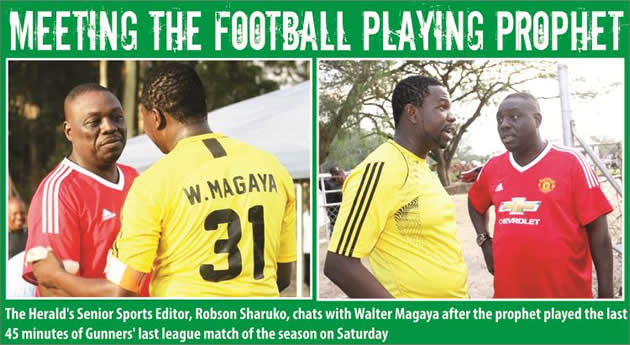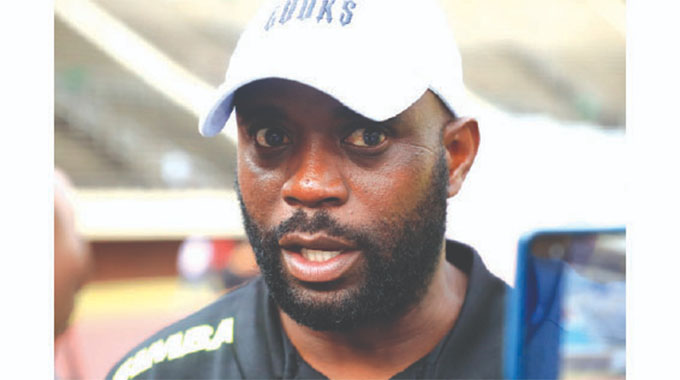Sadly, we are a sporting nation always desperate to forget our heroes

 Robson Sharuko
Robson Sharuko
ON Wednesday, the global football family paused for a moment to remember the day, 10 years ago, a Northern Irish magician, one of the greatest players of all-time, George Best, died in a London hospital, bringing the curtain down to an eventful life in which he charmed the world with his outrageous skills and playboy lifestyle.
George was so special that there is a section of Manchester United fans, the team that he transformed into kings of Europe — just 10 years after the Munich air disaster wiped a generation of the club’s finest players — who even believe he was better than Pele and Diego Maradona.
A giant banner used to hang proudly on the Stretford End of Old Trafford, making no apologies of where those Red Devil fans placed their idol in world football — ‘MARADONA GOOD, PELE BETTER, GEORGE BEST’, — playing around with his name as they celebrated his greatness.
This week the global football media feasted on the story, saluting a genius who was a class act on the football field, and also remembering the personality flaws that saw him become a prisoner of alcohol, wild parties and scores of beautiful women, off it.
His champagne lifestyle meant that George Best was football’s ultimate playboy, a shooting star that exploded on the game, casting a bright light on the sport in the Swinging Sixties, and then quickly fading away as the United superstar’s career — who was crowned European Footballer of the Year in 1968 — virtually ended at the young age of 27.
His life was over at the age of 59, and his 87-year-old father Dickie, sitting by his hospital bed at London’s Cromwell Hospital, when he finally breathed one last time and, in his sub-conscious state, said goodbye to our world of the living.
“I spent a lot of money on booze, birds and fast cars. The rest I just squandered,” he once famously said. “They say I slept with seven Miss Worlds. I didn’t. It was only four. I didn’t turn up for the other three.
“If you’d given me the choice of going out and beating four men and smashing a goal in from thirty yards against Liverpool, or going to bed with Miss World, it would have been a difficult choice. Luckily, I had both.
“Pele called me the greatest footballer in the world. That is the ultimate salute to my life. I was the one who took football off the back pages and put it on to page one.”
For all his monumental personality flaws, George Best, was this week being hailed as the enduring football icon, by a global football media that refuses to let his memory fade away, which remains fascinated today, as much as was the case — 50 years ago — when his magic was illuminating the game.
And Old Trafford didn’t forget too, with that banner, on the Stretford End on Wednesday night in that Champions League battle against PSV Eindhoven, which screamed — “GEORGE . . . SIMPLY THE BEST” — a reminder of a time when our team was an awesome outfit before this Dutch madman, called Louis Van Gaal, started dismantling it apart with his questionable “philosophy.”
You have to give it to our white colleagues, the way they keep alive the memories of their departed superstars, the way they honour them, even if those stars were flawed individuals like George Best, the way they give them respect for what they did which was unique and the way they refuse to let them be forgotten by the passage of time.
In sharp contrast, we seem desperate to forget our stars, find it convenient to forget their greatness, find it comfortable to forget that they were, just like George Best, also blessed with a talent, and find it comforting that we should not keep their memory alive.
Take for instance, Adam Ndlovu, who died just three years ago, in tragic circumstances when he was destined for greatness as a coach, after having served this country with distinction on the football field, a man who provided some of the goals that powered the engine of the Dream Team, a man who did not have the kind of controversy that stalked George Best.
Last Saturday, the Chicken Inn project, with a name that is synonymous with two pieces of chicken than football, celebrated its finest hour when the Bulawayo side won the league championship.
But, amid all the praise that was being heaped on coach Joey Antipas, which he deserves for writing this success story and winning his second league title in five years, something that ends all that foolish talk that his first triumph was a fluke, we appeared so desperate to forget that Adamski laid the foundation three years ago when he was in charge of this team
Adam transformed Chicken Inn, from a team that had finished eighth in 2011, a massive 16 points behind league champions Dynamos, into one that now believed it could battle toe-to-toe with the giants of domestic football and, in 2012, the year that he sadly perished in that horrific car crash, he had just led them into third place in the championship race, behind DeMbare and Bosso.
They won nearly half their league games, 13, only DeMbare and Bosso lost fewer games, they beat CAPS United 2-0 in Harare before a pitch invasion brought that contest to a premature ending, they didn’t lose to Highlanders (their two games ending in goalless draws), and they shared the spoils with Dynamos, losing 1-2 in the capital and winning 1-0 in Bulawayo.
The stunning improvement, from a previous year where they had finished eighth, to now finishing third, taking on the big boys and even beating them, was there for everyone to see, and we don’t know what the Gamecocks would have delivered last year had Adamski lived long enough to work his magic.
What isn’t in dispute is that, by finishing in sixth places, three places worse off than their position the previous year, the Gamecocks didn’t improve, the gap between them and the champions had increased to 13 points, they were beaten by such teams like Bantu Rovers and Buffaloes and lost their back-to-back duels against CAPS United.
Somehow, even though next month we will mark just three years after Adamski, a hero of all heroes when it comes to our football, died — in circumstances so tragic it should always live in our memory — we seem so desperate to have forgotten him and, crucially, even give him credit for starting the journey that has now seen his Gamecocks ruling the roost in the domestic Premiership.
On Wednesday, our colleagues, in the real world, were remembering a flawed genius, 10 years after his death, and we seem desperate to forget the good work that our hero, Adamski, did in laying the foundation, just three years ago, on which Chicken Inn built their success story.
OF COURSE, THAT’S WHAT WE ARE AS A FOOTBALL COMMUNITY
On March 12 last year, it marked the 15th anniversary of the death of Benjamin Nkonjera, the diminutive midfielder with a heart of a lion, who fought epic battles for our Dream Team, including an unforgettable battle on February 2, 1992, before 100 000 Egyptians in Cairo, in a ’94 World Cup qualifier whose fate even spilled into the corridors of FIFA in Zurich.
We called him Makanaky because, as a demonic tiger in that midfield, who took no prisoners despite his little frame, and always fought with the heart of a lion, he reminded us of Cyrille Makanaky, the Cameroon midfielder who exploded to international attention at the 1990 World Cup in Italy, playing all his country’s five games, as the Indomitable Lions marched to the quarter-finals of that tournament.
That the original Makanaky was named as one of the 25 best African footballer of all-time, by the Daily Mail of England, underlines that he was a special talent and, to us who lived in the hey days of the Dream Team, the bay-faced Nkonjera was a replica of that Indomitable Lion.
And, as the captain of that team, Ephraim Chawanda, later revealed, Nkonjera was the one whose name was always first on the team sheet when Reinhard Fabisch was naming his team because the German coach believed that he was the unsung hero of his team, its heartbeat, the man who took care of business while others grabbed all the headlines.
“Although he (Fabisch) was proud and fond of all this players, the one he loved most was Benjamin Nkonjera, both as a footballer and a person,” Chawanda, the man we called the Rock of Gibraltar, our indomitable captain, revealed later.
“When he first saw him as a young player, he knew straight away he was a great talent and wanted him on his side.”
A great talent he was, indeed, fighting battles for his country against men twice his size, and winning them in that midfield, and even scoring crucial goals for his nation, including the priceless one that gave us a 1-1 draw against Bafana Bafana, in a ’94 Nations Cup qualifier, before 40 000 South Africans, on April, 24, 1993.
Benji was Peter Ndlovu’s best friend, and roommate, in the national team, and he made such an enduring impact on the Flying Elephant that our most successful Warriors’ skipper in history, who led his country to two appearances at the Nations Cup finals, even named his son Benjamin so that the memory of his boyhood friend would not fade away.
But, of course, the 15th anniversary of Benji’s death came and went, as if nothing significant, in our football, happened on that day when our golden boy was taken away from us, at a very young age, leaving us with only memories — so golden they can never be forgotten, so rich they can never be wiped away by the passage of time, so memorable it was a privilege to be part of those who were witnesses to his star act.
On March 30 next year, it will be 10 years after Francis Shonhayi, a man who rose from humble roots to become our Warriors’ skipper, a man who used to represent the ultimate defensive shield when it came to our battles against other nations, died in South Africa.
But, I can bet you that, like Nkonjera before him, Sandura will not be remembered by a football community that quickly forgets, we find it comforting to let his memory just fade away as if he wasn’t special, as if he didn’t represent us with distinction, as if he was just ordinary, just another footballer who played this game in this country.
GIVEN WE EVEN FORGET THE LIVING, WHAT ABOUT THE DEAD?
Stewart Murisa, the man who exploded on the scene in the mid-90s as part of an awesome Green Machine that finally ended CAPS United’s wait for their first league championship, in independent Zimbabwe, something that even the golden generation of the ‘80s, led by the immortal Joel Shambo and goal-scoring ace Shacky Tauro, had failed to do during that decade, finally called time on his playing career last Saturday.
Now, Shutto, isn’t your average footballer.
He was Soccer Star of the Year in 1996, when this award represented greatness on the football field, he played for the Warriors when competition for places was really intense and only the best wore our golden shirt, and he was good, very, very good.
And he played on, in this game, defying some career-threatening injuries, including one that kept him out of the game for two years, to remain active, as a player, up to the age of 42 when, on Saturday in Harare, after a Division Oe game against former Zimbabwe champions Gunners, he announced that he had called time on his playing career.
I was privileged to have been there when it ended, to be among the scores of the fans who witnessed the end of a great career, to be a witness when this great footballer brought down the curtain on a career that made him a cult-hero at CAPS United before shattering barriers to do very well in the colours of both Dynamos and Highlanders.
He was a rare talent, not only because there was something special about him as a football star, but because he managed to play for the country’s three big teams and wrote success stories in each of those episodes.
“It was an honour for me to play alongside Shutto and I know a lot of players who played alongside him feel the same,” Cephas Chimedza, who also was honoured as the Soccer Star of the Year, said this week.
“Great player but above all top lad, thanks for everything Shutto and good luck in your next adventure as a coach.”
And, his old friend and former strike partner, Alois Bunjira, also paid tribute to him this week on Facebook with a post that attracted more than 100 comments.
“Last weekend he quit playing at the age of 42, exactly eight years after I quit . . . Well played to Stewart Murisa. We have indeed come a long way. Maybe one day we will team again,” posted Bunjira.
“We remain best of buddies and brothers. My brother from another mother, playing till 42 is outstanding. I wish him all the best in his new role as a coach. I know he will do well.”
Incredibly, even though this great servant of Zimbabwe football was calling time on his illustrious career, at the ripe age of 42, I was surprised that there was only one journalist to cover such a special event while there were scores of journalists who were at Anfield to cover Steve Gerrard’s last match for Liverpool.
Is it because we are quick to forget, as a people, and we have already forgotten the Shutto who used to illuminate our football fields, who crossed the Great Divide, not once, but twice, and turned himself into a player for everyone?
Or, maybe, our game has changed so much and today’s football writers don’t care about, or probably don’t know, that there used to be a man like Shutto, so good, incredibly brilliant, he was the real deal, someone whose talent will make the people that they call stars today look like raw amateurs who would not even qualify to clean his boots after a game.
Given how his farewell match was largely been ignored brought me a flood of memories of one of the best parts of the movie, Titanic, when Rose DeWitt Bukater, now an old woman who survived when that megaship sank in the Atlantic, speaks to Lewis Bodine saying why those who searched the ocean floors never found anything about Jack Dawson, the man whose love blew her away on that ship, but was swallowed by the ocean after the ship broke up.
“We never found anything on Jack . . . there’s no record of him at all,” says Lewis.
“No, there wouldn’t be, would there? And I’ve never spoken of him until now. Not to anyone. Not even your grandfather,” Rose replies. A woman’s heart is a deep ocean of secrets. But now you know there was a man named Jack Dawson and that he saved me in every way that a person can be saved. I don’t even have a picture of him. He exists now only in my memory.”
But, at least, I was happy to be there, to see that Shutto didn’t only bring the curtain down but he did it in style, the way only Stewart Murisa would have done, with a double strike, in his final competitive game.
To God Be The Glory!
Come on United!!!!!!!!!!!!!!!!!!!!!!!!!
Text Feedback — 0772545199
WhatsApp Messenger – 0772545199
Email — [email protected]
Skype — sharuko58
- Chat with me on Facebook, follow me on Twitter @Chakariboy, interact with me on Viber and on ZBC’s weekly television football magazine programme, GamePlan, on Monday nights, or read my material in The Southern Times.










Comments